|
|
|
Sort Order |
|
|
|
Items / Page
|
|
|
|
|
|
|
| Srl | Item |
| 1 |
ID:
170211
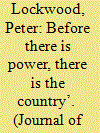

|
|
|
|
|
| Summary/Abstract |
This paper provides an ethnographic perspective on the street-level deliberations of Kenya's opposition supporters between the 2013 and 2017 elections, arguing that rather than appeals to ethnicity what defines its discourse are broader, inclusive notions of political membership. A civic nationalism is enunciated by opposition supporters that congeals support between multiple ethnic groups through its emphasis on universal values – democracy, due process, equality, adherence to the constitution. However, when such civic ideas are used in political campaigning and mobilising rhetoric, describing a resurgent Kenyan ‘people’ that has been systematically disenfranchised, they take on an exclusionary character. As ‘good constitutionalists’, opposition supporters contrast themselves with ‘bad nationalists’ associated with the government, portrayed as mobilising particularistic ethnic loyalties at the expense of a majority of Kenyans. In practice, their civic ideas remain only potentially inclusive.
|
|
|
|
|
|
|
|
|
|
|
|
|
|
|
|
| 2 |
ID:
122785
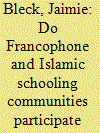

|
|
|
|
|
| Publication |
2013.
|
| Summary/Abstract |
Despite strong empirical evidence of the influence of religious brokers on political mobilisation in Africa, we know very little about the individual-level relationship between religious association and political behaviour. Drawing upon an emerging comparative literature on the effect of social service provision on political participation, this article asks whether Malian consumers of Islamic schooling are as likely to seize new democratic opportunities for electoral participation as their peers who send their children to public schools. Using an original survey of 1,000 citizens, exit polling and interviews, this analysis demonstrates that parents who enrol their children in madrasas are less likely than other respondents to report voting. Conversely, parents who send their children to public schools are more likely to participate in electoral politics.
|
|
|
|
|
|
|
|
|
|
|
|
|
|
|
|
| 3 |
ID:
168567
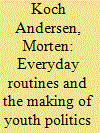

|
|
|
|
|
| Summary/Abstract |
This article illustrates some of the practices that turn young student men into political activists. It shows how everyday routine practices bring order and meaning to a social field of hierarchical competition and conflict amongst young men at Dhaka University. The focus is on those practices that make and shape the organisations everyday, involving and bringing people together in a collective of activism and exclude others. Routines continuously reconstruct relations of hierarchy, organisational order and operation, which on one hand, transform individuals from students into activists, on the other hand, it produces structured hierarchies and operational logics. It makes activism and shapes organisations. The article concludes that a focus on the internal dynamics of mobilising organisations, mundane intimate interactions and the display of public practices, can pay dividends when it comes to a deeper understanding of the formation of political activism.
|
|
|
|
|
|
|
|
|
|
|
|
|
|
|
|
| 4 |
ID:
101807
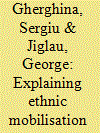

|
|
|
|
|
| Publication |
2011.
|
| Summary/Abstract |
The complex dynamics of inter-ethnic relations in post-communist countries leads to a puzzle: why do some ethnic minorities mobilise to obtain political representation whereas others do not? We use qualitative comparative analysis to capture complex causal patterns explaining the formation of ethnic parties and to analyse the combined effect of social, economic and political variables. Our article bridges a significant gap in the existing literature that usually focuses on simple explanations for the existence of ethnic parties. The analysis reveals that the political mobilisation of ethnic minorities is explained by institutional elements often underemphasised in existing theories and research.
|
|
|
|
|
|
|
|
|
|
|
|
|
|
|
|
| 5 |
ID:
109083
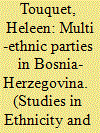

|
|
|
|
|
| Publication |
2011.
|
| Summary/Abstract |
To what extent is political mobilisation across ethnic boundaries possible in states with highly ethnicised state structures? This article explores the opportunities and obstacles that activists in Bosnia-Herzegovina meet when they seek to develop integrative discourses as a basis for political action. The first part of the article focuses on the role of multi-ethnic parties in deeply divided societies. The second part develops alternative ideas on the obstacles facing multi-ethnic parties in Bosnia, focusing on the case of Naša Stranka, a political party that was established by civil society actors. There are two conclusions to be drawn. First, despite the centrifugal nationalisms that seem to dominate the top political level, there are civil society actors in Bosnia who engage in integrative political mobilisation. Second, these actors face difficulties that go beyond the often-cited problem of the tendency of the constitutional state structure to reify ethnic identities.
|
|
|
|
|
|
|
|
|
|
|
|
|
|
|
|
| 6 |
ID:
157694


|
|
|
|
|
| Summary/Abstract |
The disintegrating discourse about youth during the perestroika period conveyed the fading legitimacy of the Soviet political order. During that era (1985–1991), media reports about young people’s discontent and political disillusionment questioned the very legitimacy of the Soviet system. Youth took to the streets early, contributing to the conditions needed to conceive of a possible failure of the USSR. This research uses a recent methodological development in text analysis—discourse network analysis—which allows for an analysis of the shifting paradigms of speaking about youth. I draw on a sample of newspaper articles to capture the variation of the heterogeneous Soviet discourse.
|
|
|
|
|
|
|
|
|
|
|
|
|
|
|
|
| 7 |
ID:
138446
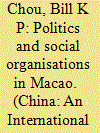

|
|
|
|
|
| Summary/Abstract |
Major social organisations in Macao fulfil the political and social functions of political mobilisation and participation, the provision of social services on behalf of the government and the co-optation of social forces by being the agents of the Chinese government in the execution of its united front policy and the vehicles of the Macao government for winning supporters. From the perspective of historical institutionalism, Macao’s political design, which centres on social organisations and dates back to the Portuguese era, is path-dependent on the modified corporatist model. By embedding social organisations into its political institution, the state can mobilise social forces to undertake state functions and weaken political opposition. Major social organisations face major challenges in their conflicting political and social functions, which weaken their ability to fulfil the role of the government’s partners and allies.
|
|
|
|
|
|
|
|
|
|
|
|
|
|
|
|
| 8 |
ID:
102363


|
|
|
|
|
| Publication |
2011.
|
| Summary/Abstract |
Conventional wisdom on the phenomenon of war is criticised for providing little relevant guidance to deal with the security challenges of our era. One reason is that this attitude uncritically assumes power as synonymous with force. In response, 'productive war' is here proposed as a re-conceptualisation of war based on Michel Foucault's alternative understanding of power. Productive war appreciates the role of violence but subordinates it to non-kinetic dynamics influencing the dimension of meaning in international security. This theoretical perspective provides a conceptual framework to deal with the dynamics of political mobilisation essential to create public support for nation-building abroad and for visions of world order.
|
|
|
|
|
|
|
|
|
|
|
|
|
|
|
|
| 9 |
ID:
188743
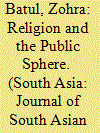

|
|
|
|
|
| Summary/Abstract |
The engagement of religion in political movements adds credibility to the struggle and commands participation that is difficult for believers to disregard. The political leaders in the Kashmir Valley, from a range of positions, have gained legitimacy by linking their political movements to Islam and its icons, such as shrines and mosques, particularly in the early twentieth century. Owing to the enduring conflict in Kashmir and limited spatial availability for dissent, sacred spaces have emerged as the predominant sites of political mobilisation. By employing ethnographic research and critical discourse analysis, this study demonstrates that mosques and shrines play a notable role in Kashmir’s politics, facilitating the articulation of an oppositional discourse to the statist narrative. The article further states that the use of sacred sites and other religious symbols has favoured an Islamic framework in the conflict politics of Kashmir; nevertheless, it is not essentially an Islamic movement in terms of its goals and convictions. These concerns are explored in congruence with the ways in which religious nationalisms intersect with political movements in the public sphere of non-Western societies.
|
|
|
|
|
|
|
|
|
|
|
|
|
|
|
|
| 10 |
ID:
044701
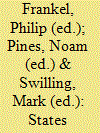

|
|
|
|
|
| Publication |
London, Croom Helm Ltd., 1988.
|
| Description |
325p.hbk
|
| Standard Number |
0709949006
|
|
|
|
|
|
|
|
|
|
|
|
Copies: C:1/I:0,R:0,Q:0
Circulation
| Accession# | Call# | Current Location | Status | Policy | Location |
| 029431 | 968.063/FRA 029431 | Main | On Shelf | General | |
|
|
|
|
|
|
|
|
|